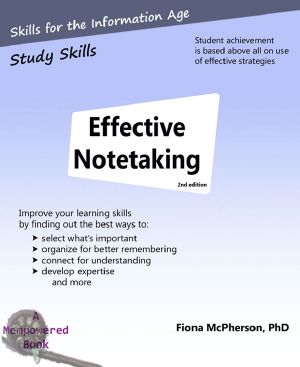Effective Notetaking · 2nd Edition

- Authors
- McPherson, Fiona
- Publisher
- Fiona McPherson
- Tags
- study skills , education
- ISBN
- 9781927166000
- Date
- 2007-03-01T00:00:00+00:00
- Size
- 2.77 MB
- Lang
- en
You can predict how well a student will do simply on the basis of their use of effective study strategies.
Effective notetaking is for college students who are serious about being successful in study, and teachers who want to know how best to help their students learn.
Being a successful student is far more about being a smart user of effective strategies than about being 'smart'. Research has shown it is possible to predict how well a student will do simply on the basis of their use of study strategies.
This workbook looks at the most important group of study skills - how to take notes (with advice on how to read a textbook and how to prepare for a lecture). You'll be shown how to:
- format your notes
- use headings and highlighting
- write different types of text summaries and pictorial ones, including concept maps and mind maps (you'll find out the difference, and the pros and cons of each)
- ask the right questions
- make the right connections
- review your notes
- evaluate text to work out which strategy is appropriate.
There's advice on individual differences and learning styles, and on how to choose the strategies that are right for both you and the situation.
Using effective notetaking strategies will help you remember what you read. It will help you understand more, and set you on the road to becoming an expert (or at least getting good grades!).
Successful studying isn't about hours put in, it's about spending your time wisely. You want to study smarter not harder.
As always with the Mempowered books, this thorough (and fully referenced) workbook doesn't re-hash the same tired advice that's been peddled for so long. Rather, Effective notetaking builds on the latest cognitive and educational research to help you study for success.
This 3rd edition has advance organizers and multi-choice review questions for each chapter, plus some additional material on multimedia learning, and taking notes in lectures.